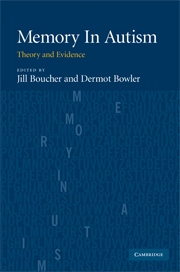Book contents
- Frontmatter
- Contents
- List of tables
- List of figures
- List of contributors
- Foreword
- Preface
- Part I Introduction
- Part II The neurobiology of memory in autism
- Part III The psychology of memory in autism
- 7 Memory within a complex information processing model of autism
- 8 Episodic memory, semantic memory and self-awareness in high-functioning autism
- 9 Episodic memory and autonoetic consciousness in autistic spectrum disorders: the roles of self-awareness, representational abilities and temporal cognition
- 10 Impairments in social memory in autism? Evidence from behaviour and neuroimaging
- 11 Memory characteristics in individuals with savant skills
- 12 Working memory and immediate memory in autism spectrum disorders
- 13 Rehearsal and directed forgetting in adults with Asperger syndrome
- 14 Memory, language and intellectual ability in low-functioning autism
- Part IV Overview
- Index
12 - Working memory and immediate memory in autism spectrum disorders
Published online by Cambridge University Press: 05 November 2009
- Frontmatter
- Contents
- List of tables
- List of figures
- List of contributors
- Foreword
- Preface
- Part I Introduction
- Part II The neurobiology of memory in autism
- Part III The psychology of memory in autism
- 7 Memory within a complex information processing model of autism
- 8 Episodic memory, semantic memory and self-awareness in high-functioning autism
- 9 Episodic memory and autonoetic consciousness in autistic spectrum disorders: the roles of self-awareness, representational abilities and temporal cognition
- 10 Impairments in social memory in autism? Evidence from behaviour and neuroimaging
- 11 Memory characteristics in individuals with savant skills
- 12 Working memory and immediate memory in autism spectrum disorders
- 13 Rehearsal and directed forgetting in adults with Asperger syndrome
- 14 Memory, language and intellectual ability in low-functioning autism
- Part IV Overview
- Index
Summary
Introduction
This chapter provides a brief overview of research on short-term and working memory function in autism. Our discussion first considers some of the general findings relating to memory performance in autism and then turns to the case of storage over the short term. The more complex case of working memory tasks where both processing and maintenance are necessary is then discussed.
Autism and memory
Early studies of people with autism described them as having good rote memory but impairments of higher-order memory functions requiring more elaborate processing or organization of materials (Hermelin & O'Connor, 1970). With the development of memory theory, research into the spared and impaired memory functions of individuals with autism has generated a more comprehensive, and more complex, picture.
Some studies have identified mnemonic abilities that are in the normal range. First, there is evidence that priming is unaffected in autism, at least in higher-functioning individuals (HFA; e.g. Bowler, Matthews & Gardiner, 1997). Another area of strength is cued recall, which appears preserved even in individuals with low-functioning autism (LFA; Boucher & Lewis, 1989; Boucher & Warrington, 1976; Tager-Flusberg, 1991). Recognition memory also seems to be in the normal range for relatively able autistic groups (Barth, Fein & Waterhouse, 1995; Minshew et al., 1992; Minshew et al., 1994); however, there is evidence of a deficit in those with global cognitive impairment (e.g. Boucher & Warrington, 1976). More recent studies suggest that this view of preserved recognition memory in HFA needs to be qualified.
Information
- Type
- Chapter
- Information
- Memory In AutismTheory and Evidence, pp. 231 - 248Publisher: Cambridge University PressPrint publication year: 2008
Accessibility standard: Unknown
Why this information is here
This section outlines the accessibility features of this content - including support for screen readers, full keyboard navigation and high-contrast display options. This may not be relevant for you.Accessibility Information
- 6
- Cited by
